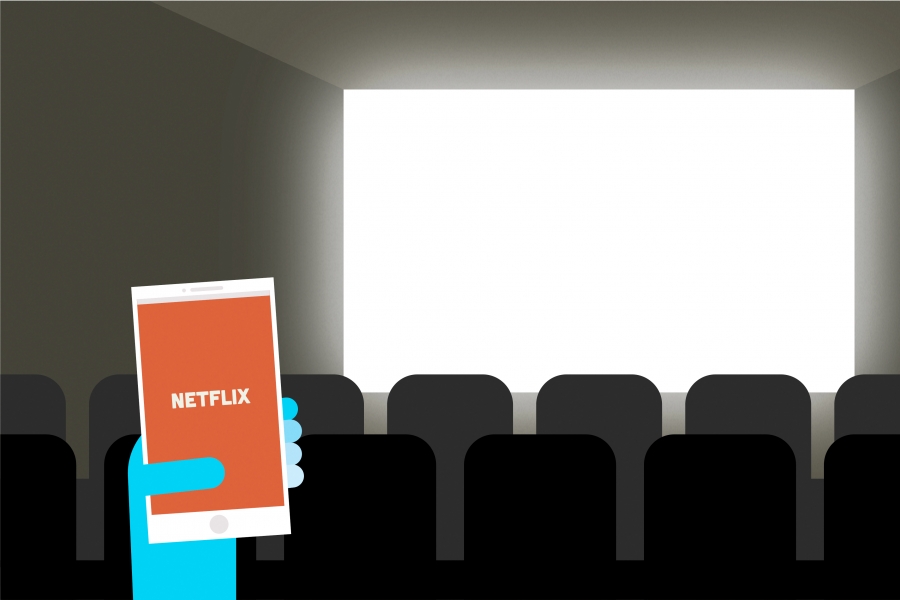
An industry in flux flunks, gets flack
 The conflict between cinema purists and the emerging power of online streaming recently got a lot of media attention due to the decision by the Cannes Film Festival to ban Netflix films from competing for its prizes. Netflix responded by pulling all of its films from screening at the festival, canning Cannes altogether.
The conflict between cinema purists and the emerging power of online streaming recently got a lot of media attention due to the decision by the Cannes Film Festival to ban Netflix films from competing for its prizes. Netflix responded by pulling all of its films from screening at the festival, canning Cannes altogether.
I take neither side in this debate because it’s stupid and shouldn’t be happening in the first place and only is happening because both sides fail to recognize what’s actually in their best interests.
This debate has been framed as a battle over the “future” of cinema and the “definition of cinema.” One side believes that the history of cinema must be honored and that the experience of seeing a movie on the big screen is an essential part of what makes a movie a movie. Earlier this year, Steven Spielberg even claimed that films produced by Netflix should not be eligible for Oscars. Meanwhile, the supporters of streaming services believe that a film is defined based on the form, not on the method of viewing and the business model of the distributors.
As with every dispute ever, simplifying this down to a polarized two-sided argument eliminates all nuance and does a great disservice to both sides, whose proponents become blinded to their common interests and values. The Hollywood Reporter points out the irony of film purists despising streaming services so much, even though it’s companies like Netflix, Amazon and Hulu that are actually doing more to finance the type of art-house and auteur cinema that film festivals like Cannes pride themselves on celebrating — the type of works that may not otherwise get produced.
Netflix (unlike Amazon, for example) has always stuck to the idea that its content should be made immediately available to its subscribers. By law in France, films can’t be streamed until three years after screening in theaters. Therefore, laws would need to change or Netflix would need to compromise its business model in order for a solution to be reached. The idea of promoting and honoring films that can’t be experienced in a theater is seen as blasphemous by traditionalists. All films made with craft, care and intent deserve to be seen, regardless of how they were produced, so it’s difficult to reconcile the strict positions of each party.
Despite this stubbornness, there are less obvious reasons that make streaming more problematic for the future of the idealized cinematic experience. Many movies made for streaming have a TV aesthetic that makes them incomparable to more cinematic works. More importantly, streaming services facilitate a type of passive movie-viewing experience that allows people to pay less attention, be less engaged and not be as strongly impacted or moved.
It’s true that some films simply have to be seen on the big screen because they are immersive spectacles. Respecting cinema, however, is not about the amount of surface area a screen has; it’s about the amount of attention and thought you give it. A film demands to be scrutinized with the eyes. To not give a film the attention that its creators expect is disrespectful to their effort and vision and prevents the full effect of it from coming across.
If skillful and sensitive, the filmmakers have carefully calculated this impact. In scientific fields, the varying levels of precision of measuring tools require the scientist to account for uncertainty, which increases as more different measurements are taken. Film works in the opposite manner. All filmic techniques, such as language, lighting, cinematography, music, pacing, editing, narrative structure and staging, can be manipulated individually to contribute an overall tone that becomes more precise as more variables are added. The convenience of streaming services like Netflix allows people to disengage and not to be in a mindset that allows them to absorb all of these elements.
The key is to offer your focus. The size of the screen is only sometimes relevant when considering whether we have fully enjoyed, experienced and appreciated a film. What is more important is having the consideration to experience any particular film in a way that will do it justice. For these reasons, Netflix as had a “net” positive impact because it has expanded access to films.
It’s ridiculous to be so pureist about film when nobody has the same attitude about books of Picasso works or recordings of Mahler symphonies. While nothing beats the big screen experience, streaming services and film festivals alike must realize that ensuring a healthy future for film should be less about preserving the house of worship and more about supporting everyone’s ability to have greater access to the content. This allows people to develop stronger appreciation for film, which is the common goal. Only when people have this degree of love and respect for film can they realize that “Lawrence of Arabia” and “Dunkirk” deserve more attention than anyone can give while watching on an iPhone on the toilet.
Written by: Benjamin Porter — bbporter@ucdavis.edu
Disclaimer: The views and opinions expressed by individual columnists belong to the columnists alone and do not necessarily indicate the views and opinions held by The California Aggie.



